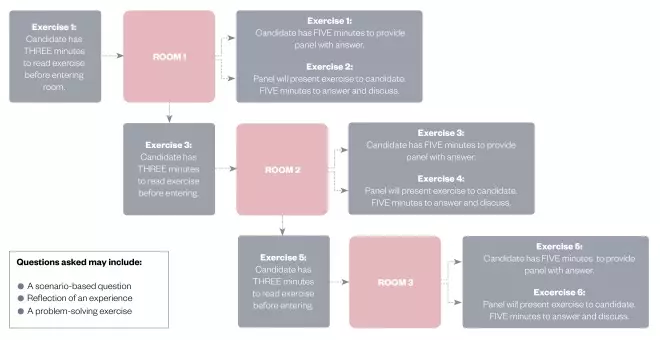
JL / Shutterstock.com
- Updated May 2025: The multiple mini interviews component is now not part of the Oriel assessment. See ‘How to prepare for the Oriel national foundation trainee pharmacist recruitment scheme’; ‘Oriel numeracy test: what pharmacy students need to know’; ‘Oriel situational judgement test: what pharmacy students need to know’; ‘How to tackle the Oriel numeracy assessment’.
Along with the numeracy and situational judgement tests, multiple mini interviews (MMIs) — a series of short, face-to-face interviews — form an integral part of the Oriel recruitment testing process.
MMIs are a recognised method of assessing candidates against a range of attributes and are used widely in healthcare, particularly in medicine. This article provides pharmacy students with tips on how to prepare for their MMI assessments.
At present, there is a limited number of pharmacy specific model questions available for students to use as part of their MMI preparation. As a result, you may be directed to online MMI resources for medical and dentistry students. While these may provide insight into the structure of MMI questions, be aware that these are not pharmacy specific and should therefore be used as a guide only (see Box 1 and Box 2 for pharmacy-related examples).
1. Familiarise yourself with the professional attributes
The preregistration pharmacist professional attributes framework (PAF) has been developed specifically for preregistration pharmacist recruitment and forms the basis of the MMIs.
The PAF comprises nine attributes; it is necessary to familiarise yourself with the first six attributes as listed below, as these will be tested in the interview exercises. The nine PAF attributes are:
- Person-centred care
- Communication and consultation skills
- Problem solving, clinical analysis and decision making
- Self-directed learning and motivation
- Multiprofessional working and leadership
- Professional integrity and ethics
- Quality management and organisation
- Resilience and adaptability
- Pharmacy in practice
You should have at least two examples prepared of how you have previously applied these attributes using the behavioural indicators as a guide (see Table). Try to cover as many of these as possible in your answers.
| Attribute | Behaviour indicator | |
|---|---|---|
| 1. Person-centred care | 1.1 | Demonstrates empathy and seeks to view situations from the individual’s perspective. |
1.2 | Places the person who is receiving care first, in everything they do. | |
1.3 | Accurately assesses, takes into account and is sensitive to the person’s current and longer-term expectations, needs, situation and their wider social circumstances. | |
1.4 | Shows genuine interest in, and compassion for, the individual; makes them feel valued.
| |
1.5 | Works collaboratively with individuals, empowering and guiding every person to make an informed choice in their care.
| |
| Source: Health Education England[1] | ||
Full details about the PAF and associated behavioural indicators can be found in the latest edition of the Oriel applicant handbook.
2. Understand the MMI structure
The MMI portion of the selection process comprises six exercises, with each testing your ability to apply different attributes from within the PAF. The interviews will be undertaken across three rooms, with two consecutive exercises carried out in each room (see Figure).

Figure: Multiple mini interview assessment structure
Source: JL / The Pharmaceutical Journal
There will be two assessing panel members, at least one of whom is a pharmacist, in each room. There may be a lay member present, whose role is to ensure the process is being followed properly and consistently throughout the day.
Your allocated time will start as soon as you enter each room and to ensure you have as much time as possible to answer the questions, the interviewers will start the interview immediately. You do not need to worry about making small talk or giving a firm handshake, just politely greet the interviewers and make yourself comfortable, ready to focus on the exercises.
Exercises may include:
- Scenario-based questions
- Reflection on a past experience
- Problem solving questions
See Box 1 and Box 2 for example exercises.
Box 1: Model question and answer for reflection on a past experience
The model answer below has been included to provide you with a broad idea of how to structure your responses. It is a very simplistic approach; your answers should cover the major points while also providing as much detail as neccessary to answer the question.
Example question:
Describe a situation where you overcame a challenging or stressful situation.
Model answer:
Situation: I have a part-time job at my local community pharmacy. One day we were very busy, and my manager needed my help performing certain duties.
Task: She asked me to complete our weekly stock order of medicines for the dispensary. This was challenging because I had never completed a stock order before. It was also very stressful because the pharmacy was busy and the order had to be sent within the next hour to ensure timely delivery of medicine the next morning.
Action: I informed my manager that I had never previously completed a stock order, but that I was keen to learn how to do it. She was able to talk me through the necessary steps of completing and submitting the order.
Result: As a result, we were able to send the order on time and ensure we had enough medicine to dispense to patients for the week ahead. In addition, I was able to complete the weekly stock order during subsequent shifts with minimal supervision. I have learnt to perform a new task and feel confident in my ability to take on extra responsibilities during busy times to help the team and benefit patients, even if I have never completed a certain task before.
First exercise for each room
Before entering each room, you will have three minutes to read an exercise. Once inside, you will have five minutes to discuss your answer with the panel. You can change your response if you are within the initial five minutes. Once this time has elapsed, the interview will then proceed to the next exercise and you will not be able to revisit the previous exercise.
Second exercise for each room
The second exercise will also involve discussion of an exercise, but this time you will not have any time to review it in advance. You will have five minutes to discuss your answer with the panel before moving to the next room.
This process will be repeated three times in total.

Source: Khalid Khan, Aamer Safdar, Atif Shamim
Example of an interview station where two interviewers will sit opposite the candidate
3. Prepare examples based on your experiences
The Oriel applicant handbook states that the three highest-ranked professional attributes to mark against are:
- Professional integrity and ethics;
- Communication and consultation skills; and
- Self-directed learning and motivation.
These would be the best place to start your preparation. The interviewers will be looking for your ability to apply the associated behavioural indicators to practice. This is where an applicant will be asked to draw upon their previous experiences to answer a question. For example: “Tell me about a time you have worked successfully in a team”.
While the exercises in the MMIs are not sector specific, it can be helpful to prepare for these based on any university or pharmacy placements you may have completed.
You may wish to draw on your experiences, both inside and outside of a pharmacy setting. While the exercises in the MMIs are not sector specific, it can be helpful to prepare for these based on any university or pharmacy placements you may have completed.
Drawing on examples from work experience in a pharmacy is highly recommended. This can greatly enrich and provide depth to your answers during both the MMIs and situational judgement tests, because it will enable you to provide context and draw on specific examples.
Remember that simply having undertaken work experience is not enough — the interviewers are seeking individuals who have gained insight from their pharmacy experience and have used it for personal development. Therefore, it is necessary to reflect on what you have learnt and how it relates to the PAF.
You will only need to have a general understanding of pharmacy laws and regulations (refer to
Medicines, Ethics and Practice
) in relation to the PAF competency, in case these attributes are assessed in the unseen exercises where your ethical decision making may come into play. Remember that the MMIs are not assessing knowledge; rather they are assessing your response to different situations; therefore, the scenario will explain the issue that you are to discuss.
Understanding your remit and limitations as a trainee would be helpful. Examples could include declining to sell an over-the-counter medicine to a patient, referring to the pharmacist if the medicine is potentially being used outside of its licence, or a similar situation where you are required to use your professional or ethical judgement (see Box 2).
Box 2: Additional example questions
The questions below have not been written by the authors and are included as examples only. Please note that these exact questions are in place to give you an idea of what you may expect — they will not be asked during the assessment. Practice answering the questions below using the STAR (situation, task, action, result) technique to familiarise yourself with the structure. Remember to link your answers to the behavioural indicators listed in the professional attributes framework.
Scenario-based question
Example:
You are the preregistration pharmacist at your local community pharmacy. One day, a concerned parent asks about whether she should have her child vaccinated, because she heard there was a risk of developing autism. How would you respond?
This exercise is not designed to test your clinical knowledge. Rather, the interview panel will be assessing your communication skills and your ability to simplify complex information and deliver it in a way that individuals from a non-medical background can understand. Remember to tailor your response accordingly and avoid jargon.
A problem-solving exercise
Example:
You are the preregistration pharmacist at your local community pharmacy. A 15-year old female presents asking for information about home pregnancy tests, but is worried about her parents finding out. How would you respond?
This exercise is testing your ability to communicate and show empathy, as well as your understanding of patient confidentiality. You will require a general knowledge of pharmacy law and ethics.
4. Listen carefully and answer the question asked
It is necessary to listen carefully to the question and work out which professional attribute is being assessed, then answer the question using your prepared response. Remember it is your behaviour and decision-making being assessed, not your clinical knowledge, even though there may be references to a medicine in the question.
If you are sharing an example, make sure you address the questions being asked rather than just tell the story of how it happened
Give as much relevant information as you can, but be aware that speaking at length while being vague makes it harder for the interviewer to pick out your main points.
You may be asked additional prompting questions. This ensures all candidates are scored against the same criteria. It is important that you listen carefully and provide concise answers to what is being asked. When you are nervous, it is easy to talk about your experiences without actually answering the questions.
If you are sharing an example, make sure you address the questions being asked rather than just tell the story of how it happened. For example, if sharing your experience of overcoming a challenging situation, it is important to explain why it was a challenge, so the interviewers have some context. Similarly, if something was very stressful for you it’s important to detail why (see Box 1).
The interviewers will each have a tablet device on which they will be recording their scores and comments. You should be aware that this may be done while you are talking, but don’t let that put you off — they are listening carefully and recording everything while it is still fresh in their minds.
5. How to structure your responses
It is helpful to have a structure to your answers; one way to do this is to use the STAR approach:
S — Situation: describe the situation to provide context;
T — Task: outline what you were trying to do;
A — Action: detail the actions you took to achieve the task;
R — Result: explain what happened as a result.
You do not necessarily need to end with a result where you completed the task, but may use this to describe what you learnt from the experience (see Box 1).
Make sure that your examples are answering the questions posed to you. This is important because the questions relate to the behavioural indicators and will help you scoring you do better in the interview.
6. Don’t expect feedback
One thing that you may find unsettling is the lack of feedback received during the interviews. Interviewer training includes instruction to avoid providing anything that may be perceived as feedback, so you should not expect comments, such as “well done”, when you have finished. This is to ensure consistency for everyone being interviewed.
You should remember that the MMI is a job interview and, as such, each interviewer will have their own style and will have been given guidance on how to interact. While one interviewer may look engaged another may not offer an encouraging smile or acknowledging nod. If this happens, it is important to remind yourself that the interviewer could just be following instructions or have a naturally impassive style, and that it is not a reflection of your answers. A method to help you prepare for this behaviour could be to ask a friend to listen to you talk about a subject for two minutes without reacting or making any facial expressions.
7. Take each station separately
Don’t worry if you think you have had a bad station. The benefit of having exercises in different rooms with a range of interviewers, is that you get a fresh attempt in each one and multiple opportunities to perform.
Before entering each room, allow yourself a moment to take a deep breath, calm any nerves and get ready to go again. Keep reminding yourself you are only being scored on the content of your answers and not your delivery, so if you get nervous and start stammering, compose yourself and collect your thoughts — you won’t lose any marks for doing so.
The key to successful interviews is to show your best self and to confidently answer the questions to the best of your abilities. Always remember that preparation is essential to success.
About the authors
Khalid Khan is head of training and professional standards at community pharmacy chain Imaan Healthcare. He is also a preregistration training programme director at Health Education England.
Aamer Safdar is principal pharmacist lead for education, training and development at Guy’s and St Thomas’ NHS Foundation Trust, where he manages the preregistration programme at his hospital.
Atif Shamim is primary care lead for London and South East at Health Education England, and the national clinical lead for the preregistration recruitment scheme.
- This article was amended on 10 September 2019 to clarify that the first six attributes of the PAF will be tested in the interview exercises
References
[1] Health Education England. Pre-registration Pharmacist Professional Attributes Framework (PAF). 2016. https://www.lasepharmacy.hee.nhs.uk/dyn/_assets/_folder4/_folder4/national-recruitment/PreregistrationPharmacistProfessionalAttributesFramework.pdf (accessed September 2019)


